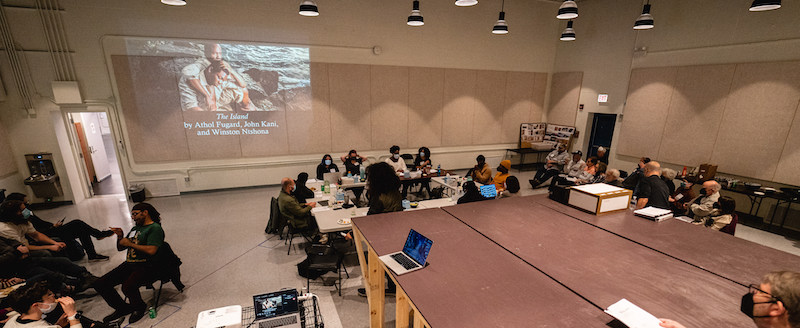What is Devised Theatre?

Arguably one of the most collaborative and exciting ways to create a piece of art, devised work is based on the real-life experiences, feelings, ideas, and reactions of the artists. It’s personal. It’s immediate. And it’s how The Island came to be.
According to the Kennedy Center, devising is “the process of collaboratively creating a new work without a pre-existing script wherein the collaborators are also the performers. In the standard theatre model, a single playwright writes the text and then a director casts actors and selects designers to interpret that text, resulting in a theatre production. With devised theatre, however, the collective artists begin without a script. A devised piece of theatre can literally start with anything: a painting, a song, a real-life event, a novel to adapt, etc.“
The article, Devised Theatre: Ten Tips for a Truly Creative Collaboration, offers additional explanation: “From actors to technicians, everyone is involved in the creative process…It’s both an exhilarating and terrifying way to work. [It poses] the challenge of creating a show from scratch, but with this freedom comes a significant catch: there’s no [source] script; no safety net.”
This was the process used by Athol Fugard, John Kani, and Winston Ntshona as they created The Island within the span of fourteen days.
Says Fugard, “[It was] totally collaborative work, you know, the three of us getting together and after a process – four, five, six weeks later – there was a play…I’ve actually found that actors and their comments and their reactions to moments have helped me see possibilities that weren’t there in mind. They weren’t there originally, and have actually led to some additional text being written….There were little moments that the two actors enriched for me and helped me develop and fill out.” This is devising in its essence.
As a theatre artist, Fugard “was determined to achieve ‘a more immediate and direct relationship with [the] audience'” and, for him, devising was a way to do so. Grounding productions in reality makes them more resonant, more moving, for both the performers and the audience alike. And Director and Associate Artistic Director Gabrielle Randle-Bent intends to do the same. “In order for this production to be as alive, as relevant, and as engaging as I know it can be, we have to make it together,” she says. “[The Island] is something that should be re-made through the creative process, rather than re-staged; to try to be faithful to the text is actually a kind of infidelity. You have to make it alive for your moment, for the relationship between the two men you’re working with, and for the political stance they’re taking in their society today.”
We’re looking forward to what Gabby, Ronald L. Conner, Kai A. Ealy, and the rest of the team create. See the final product by attending The Island, onstage at Court from November 11 – December 4 → Get Tickets
Source: Berner, Robert L. “Athol Fugard and the Theatre of Improvisation.” Books Abroad 50, no. 1 (1976): 81–84. https://doi.org/10.2307/40130109.